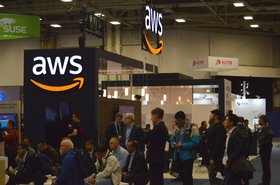The outspoken creator of Linux, Linus Torvalds, has shared his views on Arm's latest attempt to gain a foothold in the server market - and his comments were far from positive.
Torvalds launched the Linux kernel project back in 1991. Today, the derivatives of this code power the overwhelming majority of the world’s servers, along with countless supercomputers, routers, switches, set-top boxes, and every consumer device that runs Android OS.
A matter of workstations
In a forum post, first reported by The Register, Torvalds responded to the announcement of the Arm Neoverse N1 and E1 chip designs.
The problem, Torvalds said, is that for Arm to be successful in the server space, it needs developers to regularly use Arm on their workstations, but in reality they simply use x86 systems.
"If you develop on x86, then you're going to want to deploy on x86, because you'll be able to run what you test "at home" (and by "at home" I don't mean literally in your home, but in your work environment). Which means that you'll happily pay a bit more for x86 cloud hosting, simply because it matches what you can test on your own local setup, and the errors you get will translate better."
He continued: "Guys, do you really not understand why x86 took over the server market?
"It wasn't just all price. It was literally this "develop at home" issue. Thousands of small companies ended up having random small internal workloads where it was easy to just get a random whitebox PC and run some silly small thing on it yourself. Then as the workload expanded, it became a 'real server.' And then once that thing expanded, suddenly it made a whole lot of sense to let somebody else manage the hardware and hosting, and the cloud took over."
In his view, "without a development platform, Arm in the server space is never going to make it."
Not everybody agrees - in a post on Hacker News, Salvatore Sanfilippo, developer of in-memory data structure store Redis, explained that he was able to port to Arm with minimal work. "I can't relate to what Linus says there. If a low level piece of code written in C, developed for many years without caring about Arm, just worked almost out of the box, I can't see the Ruby or Node application to fail once uploaded to an Arm server," he said.
In a statement to The Register, Arm said: "We appreciate Mr Torvalds's opinion and agree that having end-to-end development platforms is essential, which is why we’ve taken an important step by announcing the Neoverse N1 System Development Platform (SDP) this week."
In a follow up post, Torvalds promised to try and hold off on further judgement, but said that he had "just seen too many promises and 'released' hardware that never went anywhere and nobody really had reasonably available.
"In particular, I do wish they didn't push the 'hyperscale' design so much. Maybe they got the scaling working, but honestly, I doubt it. It just takes time and effort and learning. Don't try to jump to 64-128 core targets until you've had a few years of just plain getting something like a 'simple' 8-core one right. Which they haven't actually demonstrated, so far."
He added: "But hey, maybe they'll surprise me."




